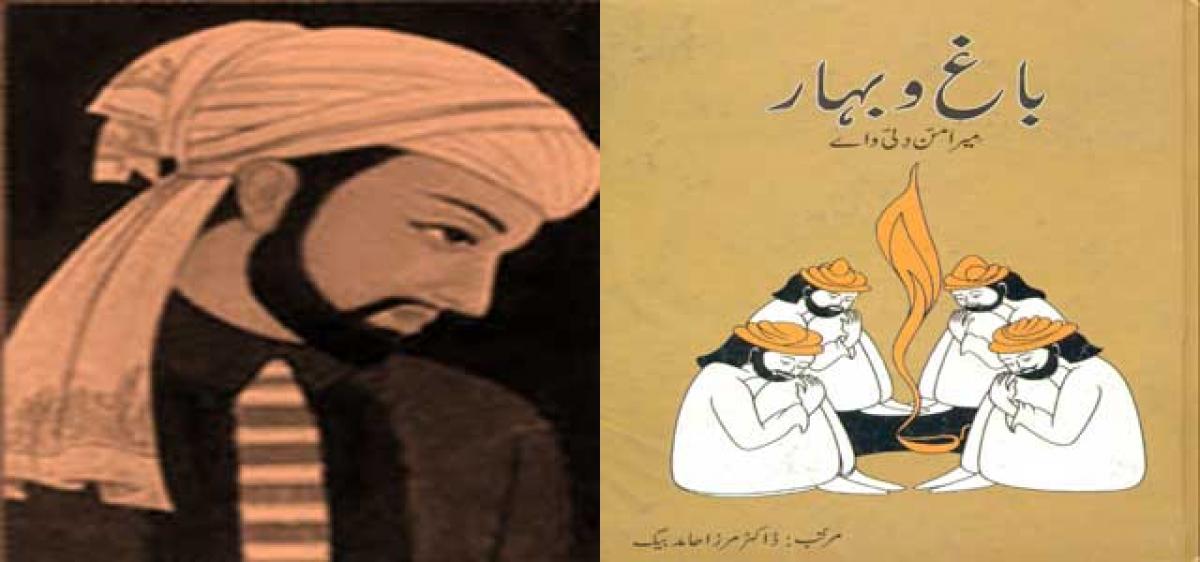Just In

A whirlwind tale of romance, adventure and magic, it is no ordinary fable – and not due to its genre. The first Indian prose fiction, or even the first novel, ‘Bagh-o-Bahaar’ is a largely neglected pioneer of what is now a thriving, multi-lingual literary tradition, but it still holds prominence due to its language and motifs of loss, mortality, courage, faith, hope and redemption.
Bagh-o-Bahar’, aimed to help the British learn conversational Hindustani and Urdu but it had an impact far beyond its textbook status
A whirlwind tale of romance, adventure and magic, it is no ordinary fable – and not due to its genre. The first Indian prose fiction, or even the first novel, ‘Bagh-o-Bahaar’ is a largely neglected pioneer of what is now a thriving, multi-lingual literary tradition, but it still holds prominence due to its language and motifs of loss, mortality, courage, faith, hope and redemption.
‘Qissa-e-Char Darwish’ or ‘Bagh-e-Bahaar’, as it is commonly known, follows the archetypical "Middle Eastern" pattern for the genre – a short framing story leading to a number of interlocking stories, some with further stories in them, but building up to a final crescendo.
The effect is of intricate inlays in an imposing whole – a feature of Persian culture, which also permeates the story of this story, which does happen to be Persian in origin.
It tells of "a great king, in whom were innate justice equal to that of Naushirwan, and generosity like that of Hatim" called Azad Bakht, reigning from Constantinople. But one day, the heirless king, who is in his fortieth year, sees his first white hair and becomes distraught at the thought of his mortality.
He turns his back on the world for prayer and contemplation, and chaos afflicts the kingdom. Ultimately the wazir meets him and convinces him not to forsake his duties.
On the eve of his reappearance in court, the king goes to a graveyard to pray. Here he sees a light and, checking, comes across four dervishes sitting in sad silence.
He is about to join them but decides to check their antecedents, and hears two of them tell their stories. By then it is morning, and he has the four summoned to court, where he hears the remaining two, and recites his own.
The four, revealed to be a trader from Yemen, two princes of Persia and one of China, have common stories – they have been fortunate in love and then unfortunate, with their beloved snatched away mysteriously.
They are about to kill themselves in despair when a green-veiled horseman (who identifies himself by sobriquets of Hazrat Ali, the Prophet's cousin and son-in-law) appears to stop them, offers them solace and tells them to go to Azad Bakht's kingdom, where they will be reunited with their loved ones.
The fate of the four men and the king is the crux of this delightful and engrossing tale, which, as said, has its own strange origin.
The early 19th century nobleman in straitened circumstances to whom we owe the story's modern version, in the preface of his Urdu translation, held the original writer was that incomparable Indian Renaissance Man – and with a noble aim.
Mir Amman Dehlvi, who was working for the then British rulers as a translator in Fort William College, writes, it "was originally composed by Amir Khusru, of Dihli, on the following occasion; the holy Nizamu-d-Din Auliya, surnamed Zari-Zar-bakhsh, who was his spiritual preceptor, (and whose holy residence was near Dilli, three Kos from the fort, beyond the red gate, and outside the Matiya gate, near the red house), fell ill" and Khusro, who took care of him, recited the tale "to amuse his preceptor's mind".
"God, in the course of time, removed his illness; then he pronounced this benediction on the day he performed the ablution of cure: 'That whoever will hear this tale, will, with the blessing of God, remain in health': since which time this tale, composed in Persian, has been extensively read."
It is an attractive story, but unlikely. Esteemed Urdu scholar Maulvi Abdul Haq disproved it, saying this fact "neither is it mentioned anywhere in his (Khusro's) writings, nor does this information appear anywhere in this Persian qissa" while the "hamd" (verse praising God) at the beginning of this Persian manuscript has the pen-name "Safi" and it "cannot be expected that a masterful and accomplished poet like Khusrau would have copied the work of some other, unknown poet".
Haq, who calls ‘Bagh-o-Bahar’ one of "those few books of Urdu that in fact will live forever", however admits that it is possible that Khusro may have known of the work, and recited it to the great Sufi saint. He provides a more plausible provenance (his foreword in the annotated online English translation by mid-19th century British academician Duncan Forbes).
But ‘Bagh-o-Bahar’, aimed to help the British learn conversational Hindustani/ Urdu (a role it still plays for students of Urdu today) had an impact far beyond its textbook status. If Indian novelists now win prestigious literary awards or snap up lucrative deals, this was the first step on the road to this destination.

© 2024 Hyderabad Media House Limited/The Hans India. All rights reserved. Powered by hocalwire.com







